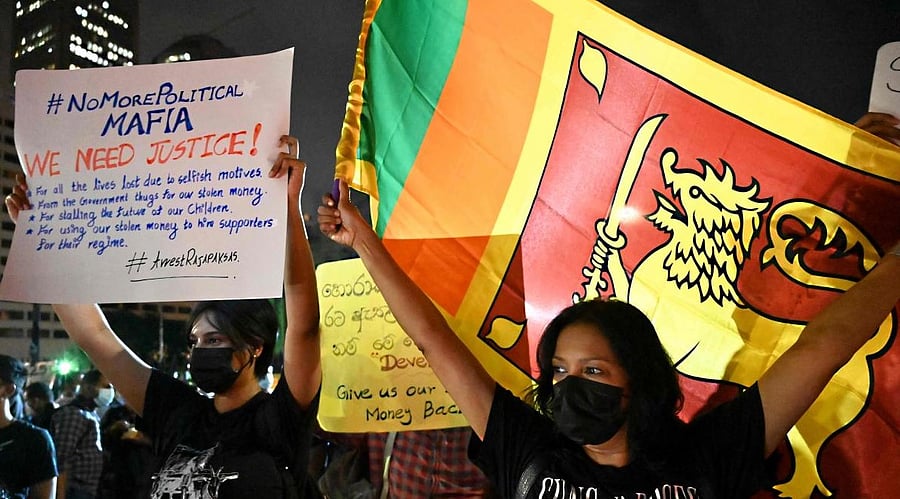
The title is just a variation of the echoes during Jawaharlal Nehru's days when China and India were sworn friends, or so it was claimed until the 1962 revelation of the truth. The difference now is that our current relationship is based on our geographical proximity, our historical identity as part of one nation, and India's close cultural ties with Sri Lanka via the huge Tamil population. Most important is that India has never been a threat to any of its neighbours.
The present Sri Lankan crisis touches India profoundly. It has been caused by bad governance over the years culminating in a virtual takeover of the country by the Rajapaksa brothers, whose portfolios controlled more than 70 per cent of the Sri Lankan economy. Mindless tax cuts for corporates, banning imports, including those of crucial chemical fertilisers, to save foreign exchange and its immediate body-blow effect on its agricultural produce and exports were only a part of the causes. Covid dealt the country another hammer blow with its immediate blockade of the invaluable tourism industry. Sri Lanka is now desperately turning to foreign friends, strangely India and China, both of which, for totally different reasons, have already been funding infrastructure-related projects in the island nation.
China has taken a considerable slice of the infrastructure projects, including a new seaport, a port city and highways funded by long-term loans calculated to keep Sri Lanka indebted long-term. It has now agreed to consider a desperate request for a further US$ 2 billion loan/line of credit after first refusing to dilute any of the terms of earlier loans. With its genuine and existing friendly relations, India has extended massive financial aid in the form of multi-billion dollar loans, currency swaps, lines of credit and extension of a repayment deadline. It has also sent material help, including large tonnages of desperately needed rice plus diesel oil, to salvage Sri Lanka's power supply. As an Indian, I ask, "Is this enough?" In my view, not only are the present commitments inadequate, but also much more long-term support is crucial and urgent for political, diplomatic and humanitarian reasons.
What Sri Lanka needs desperately is administrative and economic expertise to cleanse the existing pollution in the Sri Lankan governance and retrieve good sense and orderliness again. An immediate offer in this direction will raise the sagging morale of the people and the professional administrators. The 1991 miracle performed by the Narasimha Rao-Manmohan Singh duo has left an ever-lasting mark in the field of economic recovery and these credentials can be used to benefit Sri Lanka and us in different ways.
My idea is for India to put together a pool of administrative and economic expertise from our recently retired administrative service officers and economists, including former Reserve Bank of India governors. A team of such experts must be openly offered to Sri Lanka in the hope that the Rajapaksa government has learnt its lesson and will respond positively. This team will be stationed in Sri Lanka for varying periods as required and assist- only assist - the permanent administration in steering the Sri Lankan economy back to a path of recovery. The mutual benefits are obvious.
1. It yet again seals an existing friendship that has tended to waver in recent times. Some of the dips were artificially created by President Rajapaksa as part of his India vs China game. There are geographical and cultural connections between Sri Lanka and India that are difficult to break.
2. It gives immediate comfort to the people when they see visible steps being taken to cleanse the system. Calm and peace will hopefully be restored and repressive measures ended.
3. Our expert in situ support will strengthen Sri Lankan guarantees for loans from the IMF and others who have openly doubted Sri Lanka's reliability where repayment is concerned. India will also be able to establish robust monitoring systems to ensure corrective steps continue without a break and that the guarantees are respected.
4. This kind of intervention will help us deepen our footprints in Sri Lanka and enable us to make and help implement infrastructure and economic plans for the long-term development of Sri Lanka. This may help us prevent excessive Chinese intrusion into the country's economy.
5. A crucial step Sri Lankan people need, particularly after the Rajapaksas' rise to power, is restoring their faith in the electoral process. India has universal recognition of the effectiveness and success of its many successive elections at national, state, and lower levels. India has provided guidance in this area to a few foreign friends. Sri Lanka can benefit from this experience of ours.
The above suggestions are what Sri Lanka and India should seriously consider as unavoidable steps to be taken without delay. Their feasibility and success depend on how the Rajapaksa brothers view the present crisis – as benefiting them personally and therefore to be allowed to continue under repressive measures or worthy of their serious pragmatic attention. Time is of the essence.
(The author retired after 55 years of corporate life, and is a writer with a keen interest in domestic and international current affairs relating to politics, defence, and governance.)
Disclaimer: The views expressed above are the authors' own. They do not necessarily reflect the views of DH